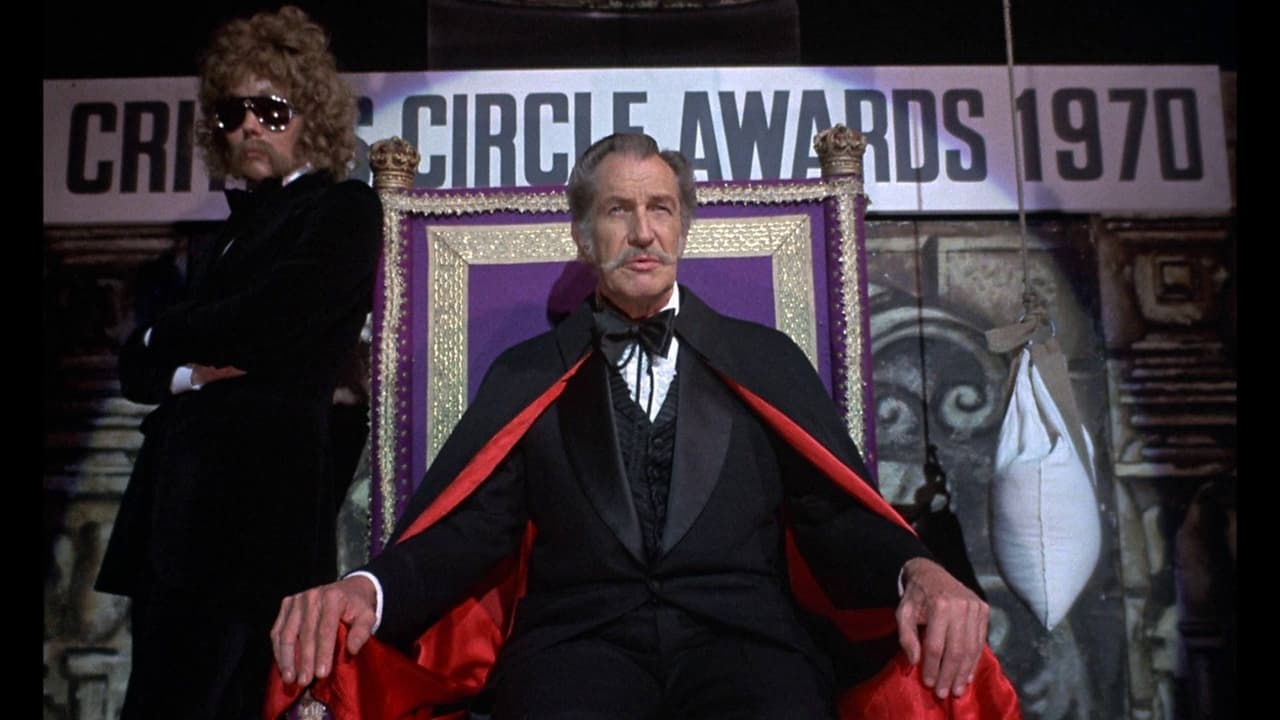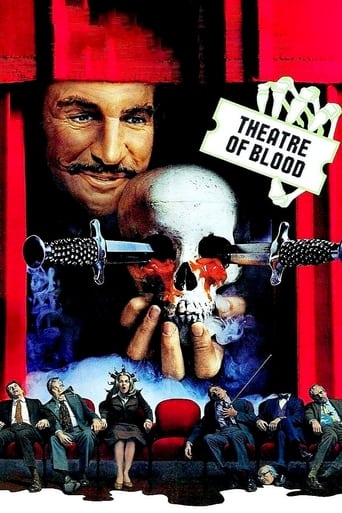

Theater of Blood is for some strange reason called one of Vincent Price's best movies, but I personally think it's one of his worst (it's only beaten by From a whisper to a scream aka The Offspring). The best and scariest part is the opening scene where the first victim is chased by crazy hobos. The rest of the movie is just boring...I had to fight to stay awake.It's also a very sadistic and cruel movie, especially when they force the fat gay guy to eat his own dogs. It's probably supposed to be funny, but I thought it was disturbing and sick. Skip this garbage and watch House on the Haunted Hill or House of Wax instead.
... View MoreVincent Price was the king of horror in the early 60s having just successfully bringing Edgar Alan Poe to the screen with director Roger Corman. To this day those films are treasured by horror fans and used in English classes to demonstrate the transfer of the written word to the screen. After those films Price starred in several other horror films but nothing that was as popular and for a time he did little more than TV appearances.That changed in 1971 when he came back to the forefront in a small film called THE ABOMINABLE DR. PHIBES. It was followed in 1972 with a sequel, DR. PHIBES RISES AGAIN. So it only seemed natural that he would come out with another horror film the following year which is where this film comes into play.Using a theme that was found in the Phibes films we have another series of deaths at the hands of a madman. This time around the protagonist is Edward Lionheart (Price), a Shakespearean actor who supposedly committed suicide after being shamed by the critics circle. But death was not meant for him yet and he survives with the help of a group of vagrants who become his henchmen/women.The critics circle is still around and doing well. But suddenly they begin to be killed off one by one. And with each death is some cryptic message involving the plays of William Shakespeare. The initial suspect is Lionheart's daughter, Edwina (Diana Rigg). But top critic Peregrine Devlin (Ian Hendry) doesn't believe it. Of course the rest of us know she's involved in one way or another as we've witnessed her at each murder in disguise, a bit that tried to make the viewer unaware but which we can see through easily.Each of the deaths of the critics is played for both disgust and humor of the darkest sort. For example one critic, fond of his two tiny dogs, has them fed to him in meat pies. As with Phibes we have her examples of cleverly written murders that are involved in a countdown to the last one. The problem is it doesn't quite work as well this time around.The fault here doesn't lie in the performance of Price or of Rigg for that matter. Both do a great job here, Price especially. It's one thing to perform a role poorly but quite another to perform it as someone trying to do it justice but doing it over the top unintentionally. The movie just doesn't have the same feel that the Phibes films did even though you can see the obvious attempt to replicate those films.In the end the move remains a fun horror film to watch but moves along at a much slower pace than the aforementioned films. That does more damage than good here. Price fans will find this a must see if for no other reason than to see his performance. The same goes for fans of Rigg.The presentation lives up to the standards of all releases from Twilight Time with the best picture quality found. Extras include an isolated score track, an audio commentary track with film historians David Del Valle and Nick Redman and the original theatrical trailer. As with all Twilight Time releases they've limited it to just 3,000 copies so if you're interested in one order it today.
... View MoreAfter losing the Critic's Circle Award for Best Actor, which he felt he deserved for his recent season of Shakespeare plays, enraged and mad actor Edwin Lionheart (Price) commits suicide. Unbeknownst to everyone, though, he survives and with the help of some vagrants start dealing his revenge on the critics, killing each of them in accordance to his plays' deaths.A darkly humorous horror/thriller, performed magnificently by Vincent Price and an excellent British supporting cast (such as Milo O'Shea, Ian Hendry and Diana Rigg); this is easily Price's best role and one of his best films. Leagues above his previous 'Abominable Mr. Phibes', even if the two feel very similar concept-wise.One of the film's main sources of profit comes from the way Price's character is set. Lionheart is a theater actor with a tendency to overact (which is acknowledged by one of the critics); this simple fact gives Price an excuse to overact as he wishes, to ham things up as he goes, and makes his performance both fun to watch and consistent with his character. Seeing him in outrageous make-up, performing for the city's bums, is priceless (excuse the pun).The Shakespearean motifs are also very well done. Not only the killings, which are both amusing and quite consistent with the plays they are based on (including a 'rewrite' of 'The Merchant of Venice's trial), but Price actually does play Shakespeare's characters nicely: he pulls off some of the monologues (in special Hamlet's and King Lear's) better than some Shakespearean actors I've seen.The film is quite colorful, a especially delightful trait of 50's-70's British horrors; this, coupled with the pervasive humor even in the more serious scenes, makes this work more as a comedy-horror than as a pure horror/thriller. No matter how you wish to look at it, though, the fact is that 'Theatre of Blood' is a very entertaining and fun film.
... View More...are just a couple of words originally coined by Shakespeare which might be used in describing this marvellous film. When it was shown for the first time on UK TV on 29th December 1978 I was expecting the usual late '60's early '70's dated swinging tripe, but from the start the credits told me this was going to be a different animal to the usual crop. I've now seen it many times and always enjoyed it and although it's obviously even more dated now it remains a weird mix of styles and emotions to go through – the visuals, acting, story and music can veer between impressive to derisory.Members of a highbrow critics circle are being butchered one by one by someone who doesn't have to brush up his Shakespeare to get some grisly vengeful laughs, always eagerly assisted by a strange hairy person and a gang of drunken tramps. And the murders are grisly if not graphic; nowadays the accent would be mainly on the gore, back then it was still the thought that counted more. The stellar cast apparently so richly deserving of possible Shakespeare-esque assassination included Dennis Price, Robert (What Ho) Coote, Arthur Lowe (who had an especially sentimental scene with Vincent Price), Coral Browne, Robert Morley, Harry Andrews, Michael Hordern, Jack Hawkins, Ian Hendry; Milo O'Shea and Eric Sykes were the obligatory pompous policemen. Diana Rigg is now sole survivor as the Grim Reaper has gone about his work relentlessly and silently since then. The film is indeterminate-brow melancholic black farce at its best with the masterful Price hamming it up for all he was worth in one of his best films – and he made many excellent "horror" and otherwise films over the years. It was much better than his previous similar films about Dr. Phibes – I can see this one repeatedly with the same old frisson unlike those efforts.If interested be prepared for a long strange trip: a black comedy, a wistful knockabout farce, an impressive melodrama, an inconsequential masterpiece, and although it's been badly dated for the last 30 years it's something you probably won't forget.
... View More